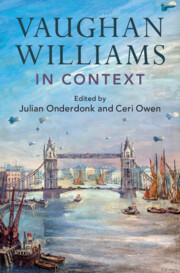Book contents
- Vaughan Williams in Context
- Composers in Context
- Vaughan Williams in Context
- Copyright page
- Dedication
- Contents
- Illustrations
- Graphs and Tables
- Musical Examples
- Notes on Contributors
- Acknowledgements
- Editorial Note
- Bibliographic Abbreviations
- Introduction
- Part I Biography, People, Places
- Chapter 1 London and the Modern City
- Chapter 2 Personality
- Chapter 3 Correspondents
- Chapter 4 Women
- Chapter 5 Friends Outside Music
- Chapter 6 Cambridge
- Part II Inspiration and Expression
- Part III Culture and Society
- Part IV Arts
- Part V Institutions
- Part VI Reception
- Further Reading
- Index of Works
- General Index
Chapter 5 - Friends Outside Music
from Part I - Biography, People, Places
Published online by Cambridge University Press: 28 March 2024
- Vaughan Williams in Context
- Composers in Context
- Vaughan Williams in Context
- Copyright page
- Dedication
- Contents
- Illustrations
- Graphs and Tables
- Musical Examples
- Notes on Contributors
- Acknowledgements
- Editorial Note
- Bibliographic Abbreviations
- Introduction
- Part I Biography, People, Places
- Chapter 1 London and the Modern City
- Chapter 2 Personality
- Chapter 3 Correspondents
- Chapter 4 Women
- Chapter 5 Friends Outside Music
- Chapter 6 Cambridge
- Part II Inspiration and Expression
- Part III Culture and Society
- Part IV Arts
- Part V Institutions
- Part VI Reception
- Further Reading
- Index of Works
- General Index
Summary
As well as his many friends in music, Vaughan Williams had some distinguished ones outside it, five notably: all agnostic liberal intellectuals with upper-middle-class backgrounds. He loved and revered Frederic Maitland, historian of medieval law, who (like himself) married into the Fisher family and who seems to have strengthened his sense of the ‘feel’ of the English past. He was on good terms with another historian from the same family, H. A. L. Fisher, who as Britain’s minister for education (1916–22) opened up possibilities for a National Opera and for the inclusion of folk music in school curricula. He collaborated with Gilbert Murray (professor of Greek at Oxford) on finding ways of presenting Ancient Greek tragic choruses on the modern stage, and relished Murray’s ideas about the workings of tradition in the arts. And he had long friendships with two Cambridge notables whom he’d first met when he and they were undergraduates at that university and who later became professors there: the philosopher G. E. Moore and the historian G. M. Trevelyan. He appreciated Moore’s musicality and admired his Principia Ethica, while Trevelyan’s literary taste and concern for English continuities paralleled and arguably influenced his own.
Keywords
- Type
- Chapter
- Information
- Vaughan Williams in Context , pp. 42 - 49Publisher: Cambridge University PressPrint publication year: 2024

